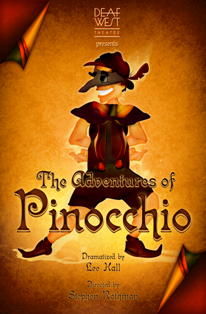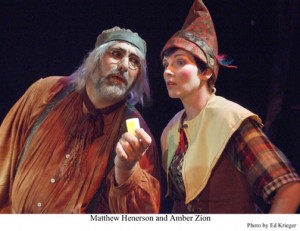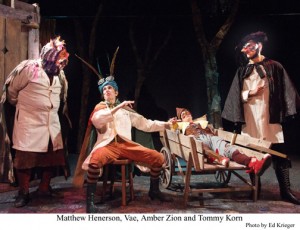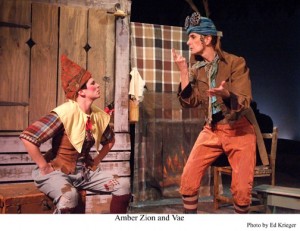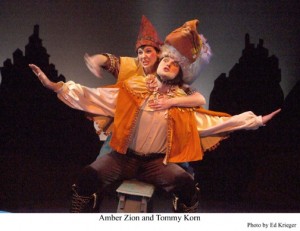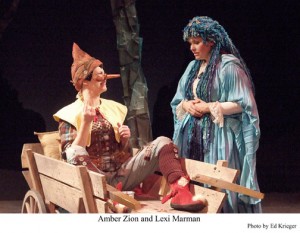TOSS IT IN THE WOOD PILE
One wonders if Deaf West Theatre’s production of The Adventures of Pinocchio could have ever taken off. This remarkably plodding production already has a strike against it by choosing the choppy adaptation by Billy Elliot’s Lee Hall: it’s a hodgepodge of children’s theatre, adult humor, and a series of Commedia dell’arte set-ups (Pinocchio Goes to School, The Fox and Cat’s Thieving of Pinocchio, Pinocchio Murders a Cricket).
Forget Disney’s iconic 1940 film which centers around a puppet who wishes to “do right†so that one day he might be a real boy: Hall’s version follows Carlo Collodi’s 1883 novel about Geppetto, an impecunious woodcarver who plans to make a living as a puppeteer when he is given a talking log by a neighbor. Immediately upon completion, the mischievous Pinocchio begins kicking his “father,†and then runs away, beginning a series of allegorical adventures meant to teach little boys to behave and mind their parents. Interestingly enough, Pinnochio is such an unlikable scoundrel that Collodi’s original ending had the puppet meet a gruesome death, hanged for his incalculable blunders! At the insistence of his editor, Collodi added almost twenty chapters during which the puppet becomes a real boy and acquires a profound ken about himself, thereby making the book suitable for children.
Hall eschews narrative for a series of misadventures with no through-line: he even gave his blessing to any theatre company to “cut, expand, and mess about to suit the strengths of all involved.†This allowance would seem to fit Deaf West, a company which uses a mix of deaf and hearing actors. Sadly, director Stephen Rothman seems to have concentrated on how this play looks, completely ignoring how it feels. The hard-working actors are at the mercy of clumsy staging, poky pacing, unfunny sight gags, and a confusing storyline – leaving them no choice but to mug for coherency.
Underdeveloped characters come and go (including a Rabbit of Death!); by the time we figure out who or what they are (a raven, the ghost of a cricket), the actor scampers up the aisle, never to be seen again. Without having read Hall’s script, it is unclear where the hackneyed dialogue comes from (“I can’t work under these conditions†or “What on earth are we going to do?â€). Equally uncertain is who is responsible for a musical number suddenly appearing near the end of act one – in fact, the entire play is pocked with incongruities. But truly, it is the adagio tempo of the piece which renders this outing interminable – the pacing seeming to be a manifestation of the director’s indecision as to who his audience is: elementary school kids or adults? In fact, the show is recommended for ages ten and up, but Joe Cerqua’s compositions seem better-suited for an episode of Barney.
It distresses me that a recommendation can not be made for a show which demonstrates what an amazingly talented and imaginative costume designer Ann Closs-Farley is; her blend of Commedia dell’arte stock character outfits, layered with the color and creativity of children’s theatre, is a stunning achievement. Evan Bartoletti’s sets are delightful: something that one would expect from puppet theatre, borrowing on the simplistic styles of Commedia as well. What really makes the sets come alive is James L. Moody’s imaginative lighting design. Regardless of how well a marionette is painted, however, it can not come to life without a master puppeteer.
photos by Ed Krieger
The Adventures of Pinocchio
Deaf West Theatre, 5112 Lankershim Blvd. in North Hollywood
Thurs and Fri at 8; Sat at 2 & 8; Sun at 2
ends on March 27, 2011
for tickets, call 818.762.2773 or visit Deaf West
